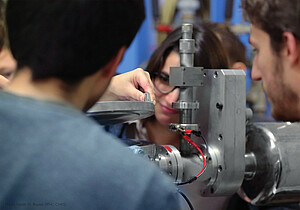Presentation
The continuing miniaturization and integration of information technologies requires a better understanding and control of the constituents of matter at a very small scale, approaching a millionth of a millimeter (nanometer), which is about twenty times the size of an atom. At these extremely short scales, the quantum nature of matter becomes dominant. By exploiting typical quantum effects, such as coherence and entanglement, we can create new and innovative devices and materials that will shape the future of technology and positively impact society as a whole.
QMat prepares the next generation of quantum scientists and engineers for this task, by putting outstanding MSc and PhD students at the forefront of international research, combined with an engaging training program bridging physics, materials science, chemistry, and engineering.
















